With nothing to chase it gave us the opportunity at last to
head as far north as possible on Mainland and after picking up lunch in Brae (as
they is not much beyond that) we decided to pop into a peaceful Busta
House. There was no wind but unfortunately
no birds either so we swiftly moved on and over Mavis Grind with the Atlantic
one side and the North Sea the other and up onto North Mavine via Hillswick
towards Eshaness.
 |
| Busta House |
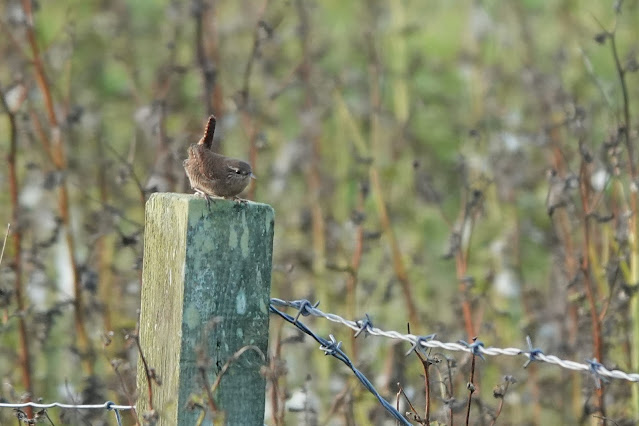 |
| Shetland Wren |
Once out in this wild and windswept landscape we stopped to
take a few shots looking to the south down the rugged wave eroded coastline and
had a look around the lichen covered walled garden of Tangwick Haa and then
down to Stenness where an immature drake Pintail flying across the bay was out
best find (and another duck to the list!).
Rock Doves, Starlings, Curlews and Golden Plovers were in the fields and
the odd Redwing and Twite were seen but to be honest I always long to come out
here for the vistas with the added hope that an American wader will totter
across the golfgreen-like sward along the headland.
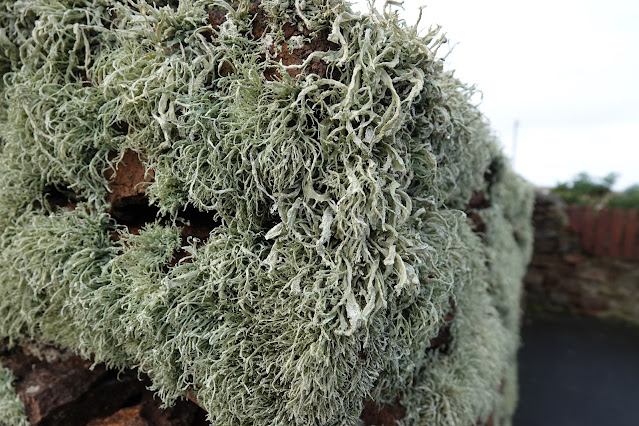 |
| Not sure if this is more than one Ramalina sp |
 |
| Harbour Seals |
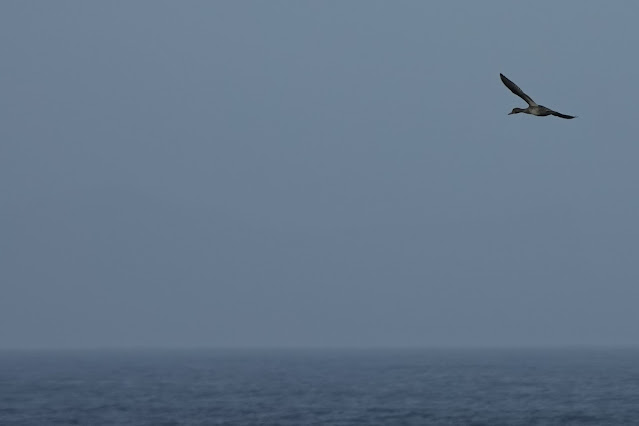 |
| Pintail |
We got to the white and yellow lighthouse and split up as
usual. I raised my bins to the sea and a
dorsal fin and blow briefly appeared. I called large cetacean on the radio but
then it came up again and I knew what I had found. The radio was ignored and I
shouted ‘ORRRRRCCCCAAAAA!’
The lads came running and the next hour was spent watching
eight of these most magnificent animals purposefully cruising about from the
top of the most magnificent cliffs. We
reckoned on a huge adult bull, five smaller female/male types and two noticeably
dinky calves. The bull was only loosely
with them most of the time preferring a single female for company. At their closest there were probably about
half a mile out (hence the graininess of the pics) but the views were simply
awesome. You could see the blow spray
with the naked eye and there was some spy hopping and several good tail
slaps. At times it felt like they were
hunting fish as the whole pod would surge forward and start changing direction
and the presence of plenty of Fulmars, Gannets and Kittiwakes suggested that food
was within reach. A small fishing boat
ended up on exactly the same line and
the Orcas came very close to it giving you a true impression of their
size.
 |
| The Bull |
Reception is very poor at Eshaness but David managed to get
a message out and a few people succeeded in getting there in time including a
very happy Donald Wilson who we had been encountering most days.
 |
| What a place to watch from |
A Sooty Shearwater that came through on the same line was my
first for many years as it flashed silvery underwings against chocolate
brown. To think it would have spent the
previous winter down around the Falkland Islands where they breed before
heading up the east coast of South America to get into British waters only to make
its way back down the west coast of Africa to be back at its nest burrow during
November.
Elated at seeing Orcas in such a memorable location we set
off on our original mission to scour the grassy plateaux for waders and
buntings. Only two birds were encountered – a Redshank and a single male Snow
Bunting that was feeding around the peaty lochan.
As usual I was distracted by the views and crashing waves
and the sheer natural isolation of the place.
 |
| Spot the cryptic Snow Bunting |
We took lunch at the end of the Heylor road overlooking
Ronas Voe and the hills above. A raft of
73 Eider bobbed around below us with a drake Common Scoter amongst them (a Shetland
tick for all of us and more quality duckage). A drake Long-tailed Duck was
around the mussel buoys along with Shags and Tysties and a Black-throated Diver
snuck out to sea almost un-noticed. We scanned the western flank of Ronas Hill
for Snowy Owls…
 |
| Ronas Voe |
 |
| Eider and a Scoter |
 |
| I do like a Rock Dove |
From here we checked out the line of pines and other trees
at the very top of the Voe at well, Voe.
A late Spotted Flycatcher had plenty of small flies to feast on and it
was so calm that you could hear the snap of its bill after each sortie. Robin
and Blackbird were the only other small birds but I was actually distracted by
more non-avian things with some late flowering Devil’s Bit Scabious, a funky
yellow coral fungi and a very impressive lichen that looked a bit like elephant
ears!
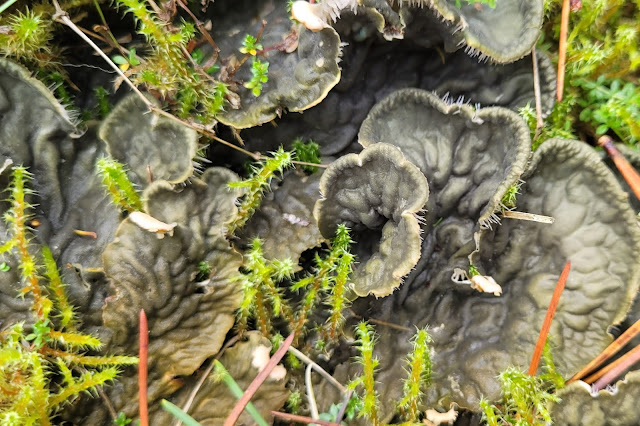 |
| Peltigera membranacea |
 |
| Peltigera membranacea - thanks Bob V |
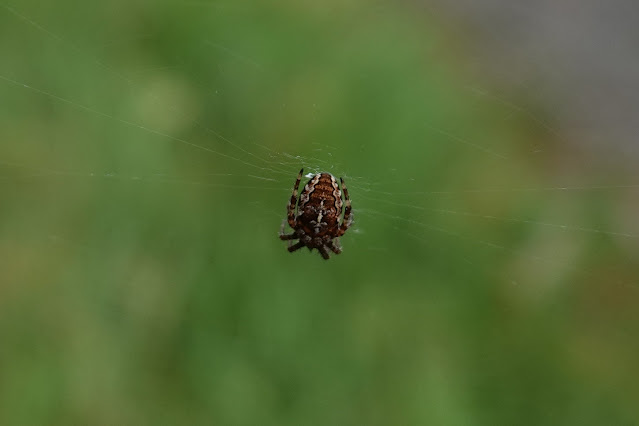 |
| Araneus diadematus I presume |
 |
| Spotted Flycatcher |
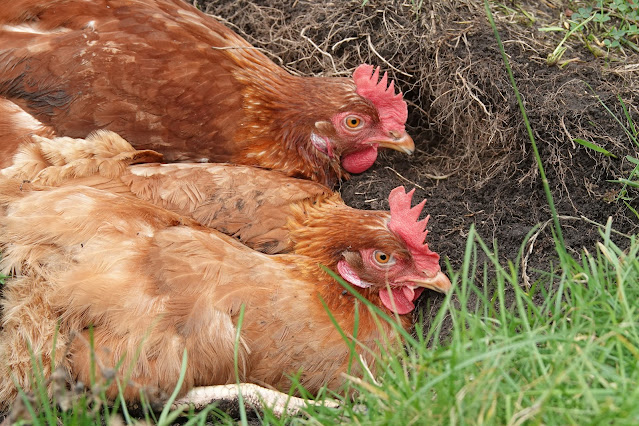 |
| Chickens in a hole... |
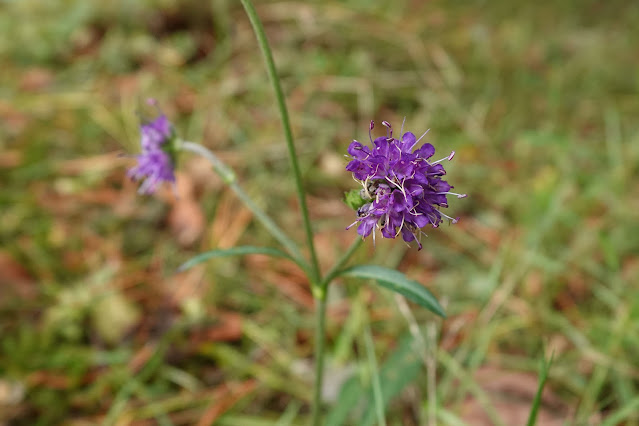 |
| Devil's Bit Scabious |
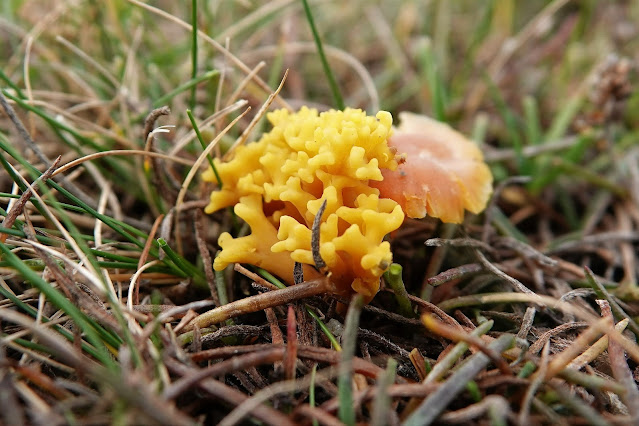 |
| Clavulinopsis corniculata and a little Waxcap - thanks Enid |
Onwards and up to North Roe (where the plane resides in a
front garden) and to Isbister for a walk around the cottages at the very top of
the island. We could not find the Olive Backed Pipit of recent days but it was
still fun looking around and enjoying the views. Starlings, House Sparrows and Blackbirds were
ever present and a three Wrens clambered around along with the odd Redwing, Meadow Pipit and Chaffinch while a large flock of Golden
Plovers spiralled in as usually happens here.
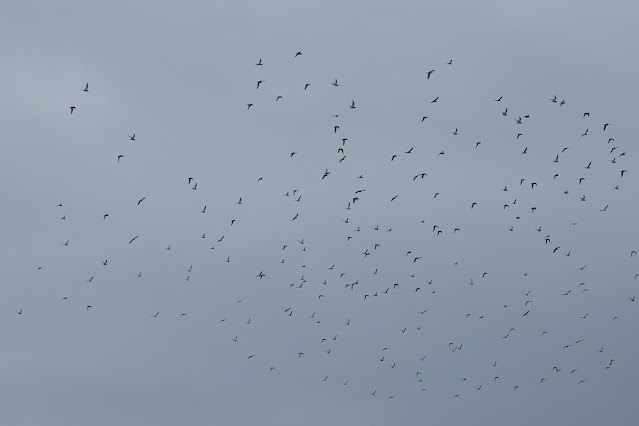 |
| Golden Plovers |
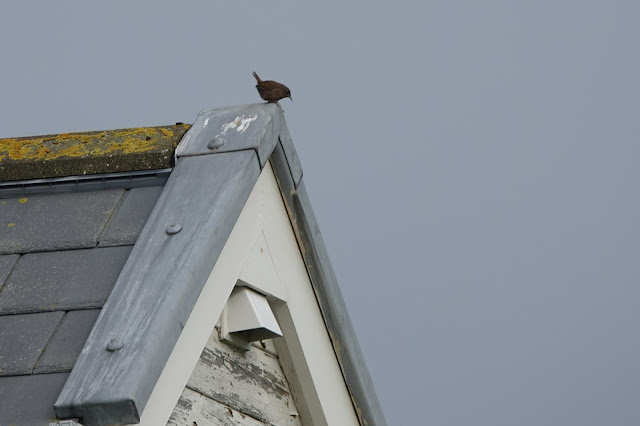 |
| Shetland Wren |
A Little Bunting had been seen in the next hamlet but again we
drew a blank but the little bay held clockwork Ringed Plovers on the sandy
beach and a Slavonian Grebe. A Pink-foot was on the nearby Loch of Flugarth and
a Great Northern Diver was offshore at North Roe as we drove back out.
 |
| Ringed Plovers |
 |
| Polecat Ferret - worse for wear |
With the day waning it was decided to gamble on trying for
Snowy Owl on Ronas Hill in the theory that any birds still present may be more
active late on. We parked at the radio masts way up on Collister Hill which
afforded huge views over the high raised bogs, boulderfields and lochans
stretching way off back towards North Roe.
We judged that there was time for as yomp and so we made our
way about a mile out to the north west to the next big ridge. It was hard going at times, skirting around clear
flowing streams across a frost fractured tundra landscape with peat cuts and
mires. I was very conscious of where I put
my feet given the amazing low growing flora beneath me and I was easily distracted
by the almost pine like Clubmosses (that Enid helped me id), lichens, sphagnum,
heather and a silvery leaved little plant that Enid expertly pinned down as Shetland
Mouse-ear Hawkweed.
 |
| Sphagnum sp |
 |
| Alpine Creeping Cedar Clubmoss - Diphasiastrum alpinum |
 |
| Northern Fir Clubmoss - Huperzia selago |
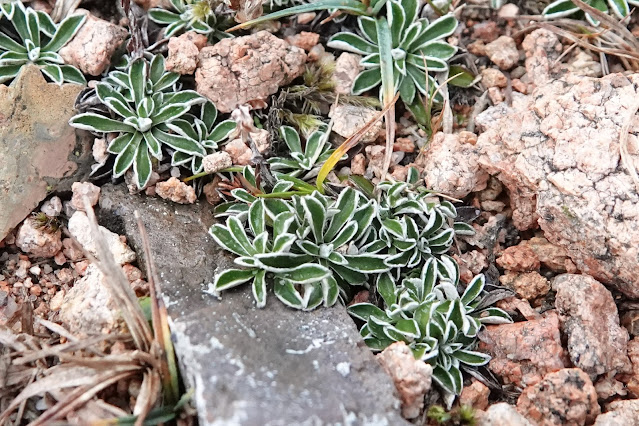 |
| Mountain Everlasting - Antennaria dioica |
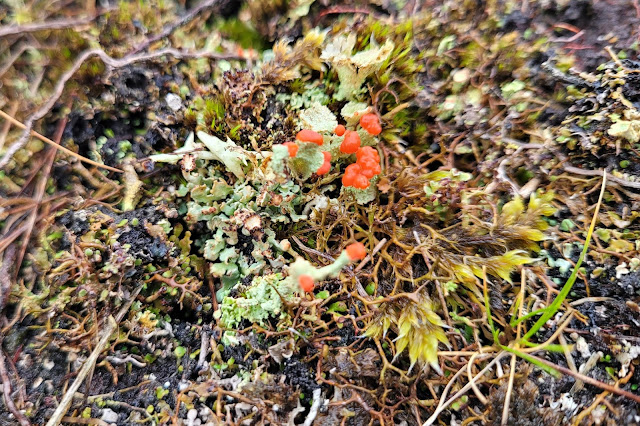 |
| Cladonia with red apothecia. possibly of the C. coccifera group - thanks Bob |
The view came and went and blowing drizzle made its way
across the lower plateaux below us and fleeting rainbows followed. It was eerily silent with only the ‘kronk’ of
a Raven, ‘suuuue’ of a solitary Golden Plover and a surprise ticking of an Uber
hardy Wren amongst the rocks. We sat and
watched and scanned with no luck until it became apparent that we could no
longer see the huge radio masts.
It was time to head back but visibility was down to about
20m but thankfully our internal navigation skills combined with the wonders of
a pointy directional arrow on David’s OS App guided us in a loop towards the
car. With no sightlines the landscape
became even more alien. I saw signs of
Red Grouse and we heard one calling some way off and this was shortly followed
by the ripple and tew of a Snow Bunting that came in to see us briefly before
flicking back off into the cloud. It is surprising
that the species is not actually resident here and Adrian said later that no
one understands why the species does not breed up there on Shetland.
About 40m from the car we could see the interp board by the
roadside but still not the towering
masts! Redwings were calling from the
compound as we packed up in the last of the light and descended back to the
main road at the end of a strange but exhilarating day.
An excellently cooked sirloin avec pomme frits and a fine 16 year old bottle of red was followed by fluffy raisin pancakes and finished off our self catering culinary exploits.






























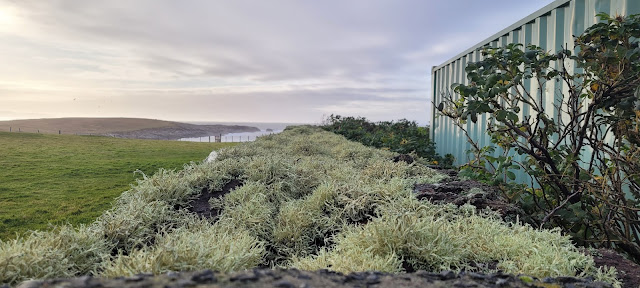










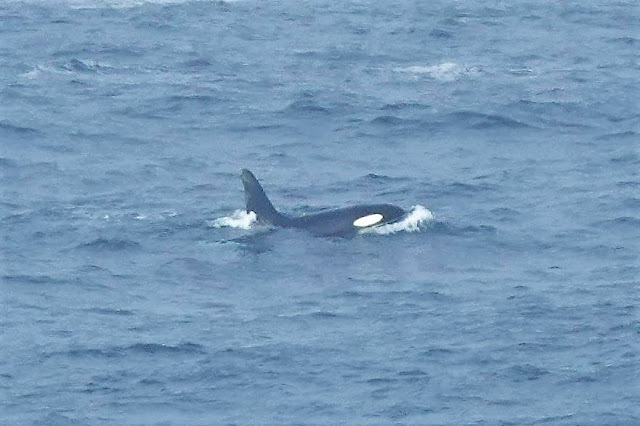
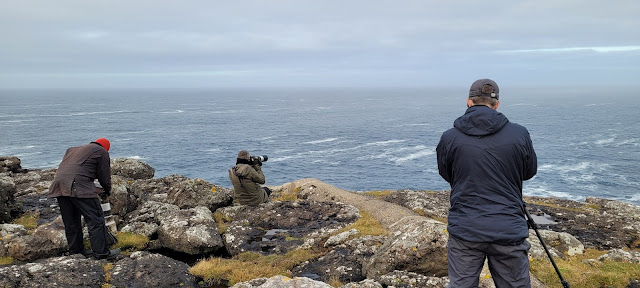













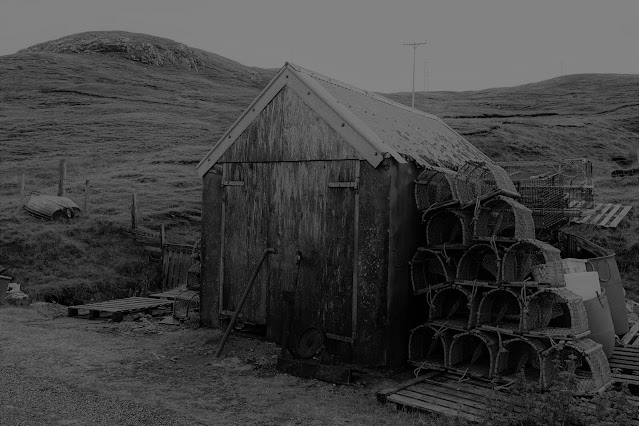





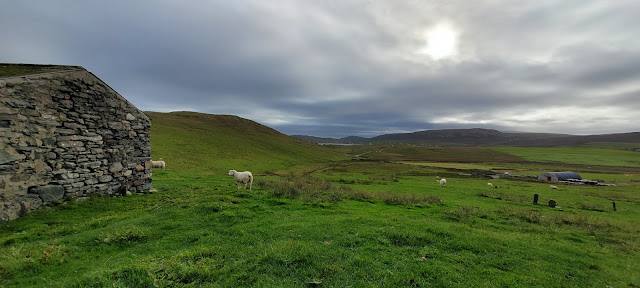











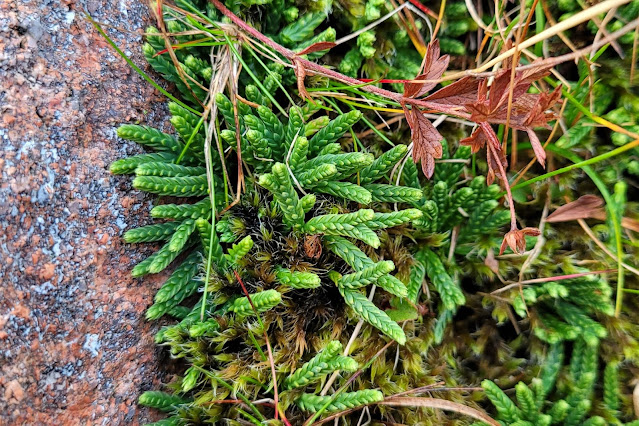



No comments:
Post a Comment